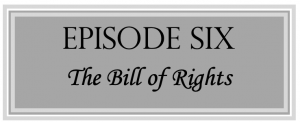6. The Bill of Rights
77

The purpose of government is to secure inalienable rights, which is the function of the Bill of Rights.
Signer of the Constitution John Dickinson defined an inalienable right as a right “which God gave to you and no inferior power has a right to take away.”
“[Human governments] could not give the rights essential to happiness… We claim them from a higher source – from the King of kings and Lord of all the earth. They are not annexed to us by parchments and seals. They are created in us by the decrees of Providence, which establish the laws of our nature. They are born with us; exist with us; and cannot be taken from us by any human power, without taking our lives.”
– John Dickinson, Constitution Signer
78
CONSTITUTIONAL DEFENSE
John Quincy Adams believed so strongly in the right to petition one’s government that he would present petitions in Congress even when he disagreed with them.
James Madison called conscience “the most sacred of property.”
“For what business, in the name of common sense, has the magistrate with our religion? The state does not have any concern in the matter. In what manner does it affect society in what outward form we think it best to pay our adoration to God? The consciences of men are not the objects of human legislation. In contrast with this spiritual tyranny, how beautiful appears our constitution in disclaiming all jurisdiction over the souls of men, securing by a never-to-be-repealed section the voluntary, unchecked moral persuasion of every person by his own self-directed communication with the Father of spirits!”
– William Livingston, Constitution Signer
EPISODE SIX: The Bill of Rights
79
“Security under our constitution is given to the rights of conscience and private judgment. They are by nature subject to no control but that of Deity, and in that free situation they are now left.”
– John Jay, first Supreme Court Chief Justice
Starting in 1640, the top issue that brought people to America was the rights of conscience.
“Congress shall make no law respecting an establishment of religion, or prohibiting the free exercise thereof. . . .’xxxiii
80
CONSTITUTIONAL DEFENSE
EPISODE SIX: The Bill of Rights
81
“Religion is the only solid basis of good morals. Therefore, education should teach the precepts of religion and the duties of man toward God.”xxxiv
– Gouverneur Morris, Signer of the Constitution
“Human law must rest its authority ultimately upon the authority of that law which is divine. Far from being rivals or enemies, religion and law are twin sisters, friends, and mutual assistants. Indeed, these two sciences run into each other.”xxxvii
– James Wilson, Signer of the Constitution
82
CONSTITUTIONAL DEFENSE
THE SECOND AMENDMENT IS COVERED IN DEPTH IN EPISODE ONE (see pages 11 through 15)
EPISODE SIX: The Bill of Rights
83
84
CONSTITUTIONAL DEFENSE
“Government is instituted to protect property. This being the end of government, that alone is a just government which impartially secures to every man whatever is his own. It is not a just government, nor is property secure under it, where arbitrary restrictions deny to part of its citizens that free use of their faculties or where the property which a man has in his personal safety and personal liberty is violated by arbitrary seizures of one class of citizens for the service of the rest.”
– James Madison
EPISODE SIX: The Bill of Rights
85
EPISODE SIX TAKE AWAYS:
- The purpose of the Bill of Rights was to remind all of us that these rights do not come from government, they are from the laws of nature and government’s job is to protect them.
- The 2nd Amendment is the palladium of all our other freedoms.
- We must teach the next generation how to use firearms and defend themselves and teach them the Constitution and how to be good citizens.
- Bring your family to the Constitutional Defense Program at the Patriot Academy Campus in Fredericksburg, Texas! PatriotAcademy.com/constitutional-defense-course
86
CONSTITUTIONAL DEFENSE
